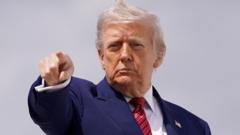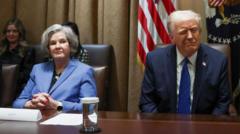Trump's concession aims to alleviate mounting tensions while both sides seek a resolution to trade disputes and unfair tariff concerns.
Trump Delays EU Tariff Hike Amid Trade Negotiation Tensions

Trump Delays EU Tariff Hike Amid Trade Negotiation Tensions
US President Donald Trump extends the deadline for trade negotiations with the European Union following threats of steep tariffs.
Trump has recently agreed to extend the deadline for trade negotiations with the European Union (EU) beyond a month, responding to escalating tension over proposed tariffs. Initially, Trump had announced a commitment to a 20% import tax on EU goods, which he later revised to 10% to facilitate further discussions. However, frustration over the pace of the negotiations spurred Trump to communicate a potential tariff increase to an alarming 50%, effective 1 June.
In a turnaround, the President took to social media to announce he would be extending the deadline to 9 July, following a constructive conversation with Ursula von der Leyen, the President of the European Commission. Von der Leyen confirmed the positive nature of their dialogue, emphasizing the EU's readiness to expedite negotiations. However, she also indicated that extra time until the new deadline would be necessary to achieve a favorable outcome.
Initially, the deadline was set for 8 July, but Trump had urged for immediate discussions. The contentious trade relationship had already come under scrutiny, particularly regarding US concerns over perceived imbalances, as the EU emerged as one of America's most significant trading partners. For example, EU exports to the US surpassed $600 billion last year, while imports were around $370 billion, according to government data.
Trump has justified his broad tariff program as a means to boost domestic manufacturing and job protection, although economists warn that such import taxes could inflate prices for American consumers. Tariffs are essentially taxes imposed on foreign goods that US businesses must pay when importing them.
Concerns have specifically revolved around car and agricultural product tariffs, with the administration confirming that while some tariffs were lifted to foster negotiations, a 25% tax on EU steel and aluminium imports persists.
During a press briefing at the White House, Trump articulated his impatience with negotiations and his intention to dramatically increase tariffs. Meanwhile, EU Trade Commissioner Maros Sefcovic underscored the bloc's commitment to securing a mutually beneficial agreement.
He reiterated the significance of respect in US-EU trade relations, stating, “EU-US trade is unmatched and must be guided by mutual respect, not threats. We stand ready to defend our interests.”
In response, the EU has maintained a measured approach, previously stating intentions to implement a 25% tariff on $18 billion worth of US goods, although this action was subsequently suspended. European leaders, including those from France and Germany, have called for diplomatic resolutions, warning that escalating tariffs would adversely affect both economies.
In a turnaround, the President took to social media to announce he would be extending the deadline to 9 July, following a constructive conversation with Ursula von der Leyen, the President of the European Commission. Von der Leyen confirmed the positive nature of their dialogue, emphasizing the EU's readiness to expedite negotiations. However, she also indicated that extra time until the new deadline would be necessary to achieve a favorable outcome.
Initially, the deadline was set for 8 July, but Trump had urged for immediate discussions. The contentious trade relationship had already come under scrutiny, particularly regarding US concerns over perceived imbalances, as the EU emerged as one of America's most significant trading partners. For example, EU exports to the US surpassed $600 billion last year, while imports were around $370 billion, according to government data.
Trump has justified his broad tariff program as a means to boost domestic manufacturing and job protection, although economists warn that such import taxes could inflate prices for American consumers. Tariffs are essentially taxes imposed on foreign goods that US businesses must pay when importing them.
Concerns have specifically revolved around car and agricultural product tariffs, with the administration confirming that while some tariffs were lifted to foster negotiations, a 25% tax on EU steel and aluminium imports persists.
During a press briefing at the White House, Trump articulated his impatience with negotiations and his intention to dramatically increase tariffs. Meanwhile, EU Trade Commissioner Maros Sefcovic underscored the bloc's commitment to securing a mutually beneficial agreement.
He reiterated the significance of respect in US-EU trade relations, stating, “EU-US trade is unmatched and must be guided by mutual respect, not threats. We stand ready to defend our interests.”
In response, the EU has maintained a measured approach, previously stating intentions to implement a 25% tariff on $18 billion worth of US goods, although this action was subsequently suspended. European leaders, including those from France and Germany, have called for diplomatic resolutions, warning that escalating tariffs would adversely affect both economies.





















